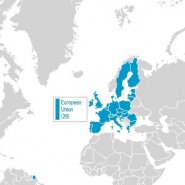Mexico Becomes First Developing Country To Post Climate Action Plan
Mexico on Friday became the first developing country to upload its proposed national climate action plan, known as its "Intended Nationally-Determined Contribution" (INDC) to the United Nations web site. The draft proposal foresees emissions peaking by 2026, and it comes on the heels of Norway’s submission on Thursday. The United States is expected to submit its proposal this week.

This article was originally posted on the AnthropoZine. Click here to read the original.
30 March 2015 | Mexico and Norway last week submitted their “Intended Nationally-Determined Contributions” (INDCs) to the United Nations web site. Mexico’s is available here, and Norway’s is here. All submissions are being posted to the UN’s INDC page, which you can find here, and they are also being summarized on the World Resource Institute’s CAIT Paris Contributions Map (see below) in a way that’s designed to offer comparability and transparency.
Praise for Mexico
Like Indonesia and several other emerging countries, Mexico isn’t using a baseline year, but instead proposes to reduce its emissions to a level 25% below a “business as usual” scenario by 2030, with that target increasing to 40% below business as usual if it receives technical and financial support within the context of a global agreement.
“Mexico’s leadership in making this announcement confirms that we are in a new era, in which all nations have a role to play in the collective fight against climate change,” said Nathaniel Keohane, Vice President for International Climate at the Environmental Defense Fund (EDF). “Since the Copenhagen conference in 2009, there has been a lot of talk about ‘bottom-up’ climate action — but nobody has really known what that looks like. Now the contours of the ‘bottom-up’ world are beginning to come into focus: Countries are taking on ambitious national commitments, supported by bilateral and regional ties — such as the strong relationship between the US and Mexico.”
“While the devil is in the details, Mexico’s plan to peak its emissions by 2026 is particularly encouraging and should inspire others to follow a similar course, said Jennifer Morgan, Global Director, Climate Program, World Resources Institute. “As a country that enacted a groundbreaking, comprehensive climate change law in 2012, Mexico clearly understands the threat of climate change and the economic benefits of smart action for its citizens and is now going further.
Additional resources
Please see our Reprint Guidelines for details on republishing our articles.

